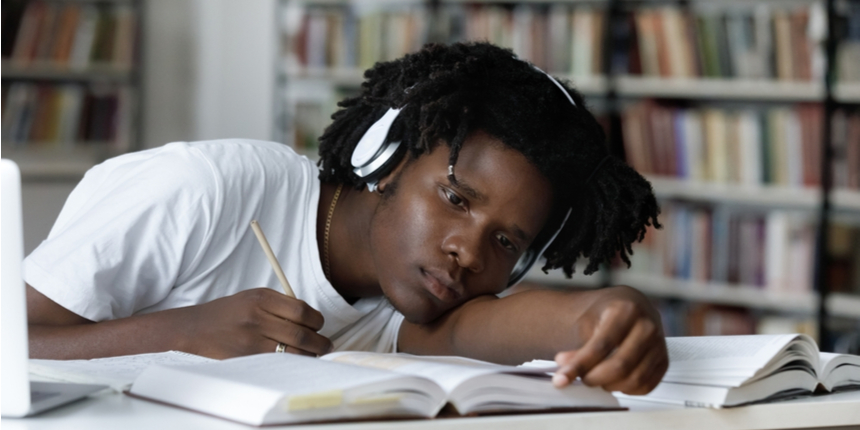What Is Academic Burnout? Here Are Ways You Can Deal With It
Imagine that you have woken up to a potentially busy morning, on a day full of classes and submissions, and so you think of going back to sleep. The thought of dealing with the day’s activities overwhelms you and makes you restless. You feel exhausted, irritable, and demotivated. If you are able to relate to this and often feel like this, then you may be experiencing academic burnout.

When one is repeatedly unable to bring about a balance between their personal life and academic work, it often results in academic burnout. As a result, the individual may get tired easily, feel anxious about everyday tasks, and find it difficult to concentrate on any activity.
What Is Burnout?
The World Health Organisation (WHO) recognises burnout as an occupational phenomenon and not a medical condition. The International Classification of Diseases (ICD-11) defines burnout as a syndrome resulting from chronic workplace stress that one is unsuccessful in managing. For students, this chronic stress results from academic pressure and expectations of consistently good performance. Academic burnout may manifest in the form of exhaustion, isolation from academic work, and reduced academic performance.
It is common for students to be exhausted after a long, tiring day at school. Students may also feel like disengaging from studies during examination time, due to the immense pressure attached to exams. However, prolonged exposure to stressors may escalate into burnout. Not everyone is able to understand that they are going through burnout. It is usually their near ones, parents, siblings, teachers, friends, and peers who call out and say things like, “You seem lost!” or “You’ve become irritable!”, or “You’ve been restless!”.
If you are experiencing burnout, you may find it difficult to keep up with your classwork, homework, and exam preparation. Academic work, assignments, daily chores, exam preparation: you don’t know what to do and where to start your work from. You may keep feeling like you have got too much to deal with. This burnout creeps up on you over a period of time, often leading to procrastination, chronic fatigue, forgetfulness, and insomnia. This may further lead to anxiety, anger, and secondary physical symptoms, such as musculoskeletal pain and headaches. At such times, students may feel a lack of accomplishment and show poor academic performance. This chronic stress is not just limited to academic engagement, but may also spill into one’s personal and social life – you may lose enjoyment in your daily activities and lose interest in social and extracurricular activities.
Causes Of Academic Burnout
When one is not able to adequately manage personal and academic stressors that we encounter on a regular basis, it may result in academic burnout. With the setting in of the pandemic, the stressors in a student’s life have particularly increased. Some of the common stressors are discussed below. However, this is not an exhaustive list.
Online Learning
The switch from physical to online learning has been a significant transition for students, parents, and teachers. Learning through an online pedagogy has been difficult and taxing for a large number of students. With reduced face-to-face interaction, students often tend to feel demotivated, inattentive, distracted, and even isolated. The inability to meet friends and enjoy the other perks of physically going to school often contributes to such feelings.
Pressure From Parents, Teachers
A lot of times, parents and teachers tend to demand too much from students in terms of academic performance. Although they wish good for the child, such demands often lead to children missing out on important recreational activities, such as playing, or practising a hobby. If the student spends all their time in studies and books, while not keeping any window for de-stressing, it increases the chances of them experiencing academic burnout. Hence, parents and teachers need to be realistic in terms of the expectations they hold from a child, and also must never impose them on the latter.
Poor Time Management
A lot of times it happens that students study for long hours, but the results are not at par with their efforts. It might be that the way they slot their study time across different subjects needs some rework. So, if you feel that reworking your timetable may help you be more productive, that is, study more in less time, then do not hesitate to reach out to your teachers, parents, or school counsellors for help in formulating a better timetable.
Unhealthy Lifestyle
It is quite common these days to see students engaged in social media at late hours during the night, thereby resulting in improper sleep. The easy availability of junk food by the click of a button on the phone has also led to an increase in the consumption of unhealthy food among students. Such factors, like a disturbed sleep cycle, an imbalanced diet, and lack of exercise, contribute to increased lethargy and lesser productivity in academics, thereby leading to academic burnout. Hence, to be able to study and perform well, a student must take ownership of their eating and sleeping routine, and physical activity.
Personal Stressors
Stressors in one’s personal life, such as discord among friends or in romantic relationships, witnessing dysfunctional relationships at home, and the like, may cause a student to remain stressed, and be unable to give their best to academics. This may be one of the reasons behind academic burnout.
Managing Academic Burnout
If you think that you may be at risk of experiencing burnout, you may reduce its likelihood by taking certain measures to improve your physical and mental health.
Identify The Stressors
Sit down in a quiet place in your room and make three columns on a piece of paper. In the first column, list down all the things that make you uneasy, anxious, worried, and stressed. In the second column, write the impact of each of these stressors on your health and behaviour. And in the last column, write how you could reduce the impact that the stressor has on you.
Prioritise Your Activities
It may be so that at one time you may have multiple engagements, an online class, a birthday party, a family lunch, or an extra-curricular activity. As a student, you need to prioritise your activities and bring balance to your academic and social life. Evaluate what is important and urgent, and accordingly choose what you engage in.
 Prioritising Activities Ensures You Get The Best Of All Worlds
Prioritising Activities Ensures You Get The Best Of All Worlds
Create A Schedule
Another way to prevent burnout is to have a schedule. Every morning, schedule your day’s activities by setting realistic goals. This will allow you to analyse what are the resources that you already have to complete these tasks and what else do you need. At the end of the day, strike out the tasks and activities that you have completed. This will give you a sense of accomplishment and motivate you to complete the tasks assigned for the next day. Arranging your work at school and home will help you be more attentive and avoid procrastination.
Use The Pomodoro Technique
To concentrate on a task adequately, it is important to take breaks when working on it. Use the Pomodoro Technique to mark your breaks. To use the Pomodoro Technique, pick a task that you wish to complete. Set a timer for 25 minutes and keep working till the timer goes off. Take a break for 5 minutes. This cycle of 25-minute work and a 5-minute break is called a Pomodoro.
After four such Pomodoro cycles, increase the break time by 15-30 minutes. Taking breaks in between study time will help you to retain information for a longer time and reduce the risk of burnout. These breaks could be in the form of a walk, using social media, talking to friends and family, or even a short nap.
Inculcate Healthy Habits
Drinking adequate water, eating healthy, and staying active, help protect not only your physical health but also your mental health. This will help improve your energy, enhance your concentration, and relax the mind and body. Teenagers need at least 8-10 hours of sleep, whereas young adults need 7-9 hours of sleep. Maintaining a healthy sleep schedule is important as it improves mood and increases productivity.
Socialise More Often
Meet your friends, talk to them, and go out with your family to gatherings. These are times when you can not only have fun with your loved ones but can also share your worries. Your friends and family would listen to you and help you if you tell them that you have something to share. Venting out to another person helps reduce the stress that you may have been carrying with you.
Go On A Digital Detox
Today, we are available to other people 24x7, given the increased usage of cellphones, internet, and social media platforms. Over-indulgence in social media networking can intrude into your precious time that otherwise could have been used in completing your day’s tasks. Learn to take a break from not only social media platforms but also gadgets in general.
Follow the 3R’s Approach
Many experts suggest the use of the 3R’s (Recognising, Reversing, Resilience) approach to deal with burnout effectively. Recognise the warning signs and symptoms of academic burnout. Acknowledge the impact of burnout and use strategies to reverse the burnout by managing stress and reaching out to your support network. And finally, build your resilience to stress by maintaining your physical and mental health.
Burnout can be reversed if you listen to your body and understand that you are stressed. Identify the source of the stress and the different alternatives to deal with that stressor. If you think that you are experiencing burnout, take time to relax and rejuvenate on an everyday basis. If you are facing difficulty in managing multiple commitments at the same time, take a step back and let go of some of these commitments. Despite this, if you feel overwhelmed and find it difficult to concentrate and complete your daily activities, you may consider seeking professional help. Most importantly, remember that you are not alone.
- Dr. Swati Jain is a Psychometrician, Creative Arts Therapist, and Rehabilitation Therapist. She has been teaching Psychology to UG students for close to a decade, and is currently Assistant Professor of Psychology at Indraprastha College for Women, Delhi University.
Applications for Admissions are open.
As per latest syllabus. Physics formulas, equations, & laws of class 11 & 12th chapters
JEE Main Important Chemistry formulas
Get nowAs per latest syllabus. Chemistry formulas, equations, & laws of class 11 & 12th chapters
JEE Main high scoring chapters and topics
Get nowAs per latest 2024 syllabus. Study 40% syllabus and score upto 100% marks in JEE
JEE Main Important Mathematics Formulas
Get nowAs per latest syllabus. Maths formulas, equations, & theorems of class 11 & 12th chapters
